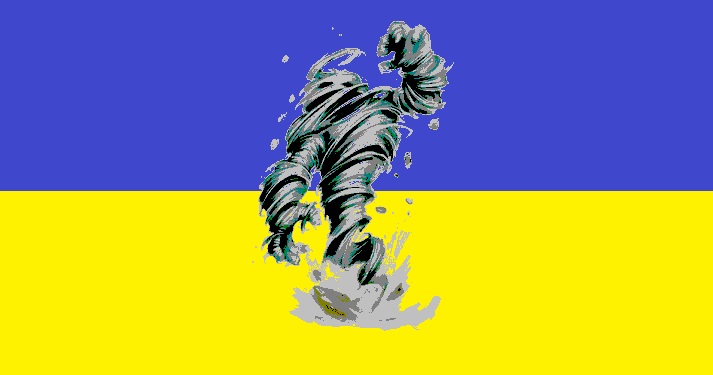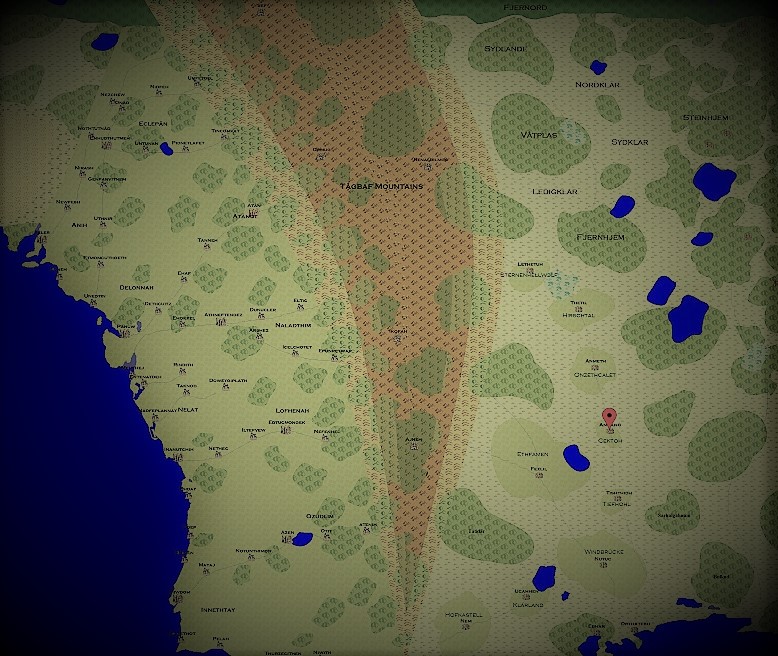Windbrücke
The second largest of the Frontier lands kingdoms Windbrücke sits in a particularly fertile area of Ebenen. This coupled with the policies of its ruler make it one of the faster growing of the new kingdoms.
Structure
Windbrücke is ruled by a king, Wynnstan Elynbrüke, the grandson of the founder. Below him are several dukes, who in turn rule over several Barons and Counts.
Public Agenda
As with most of the Frontier land kingdoms, the agenda of Windbrücke is to grow. To this end, the current ruler has passed a number of laws to encourage good farming practices, such as crop rotation and the like. Currently the ruler is working to attract tradesmen, craftsmen, and artisans to the young kingdom with some degree of success.
Assets
With the kingdom centered at a narrow spot between the Ammihlit and Rozux rivers, the land claimed by Windbrücke is exceptionally fertile, and allows for much crop growth. Nevertheless, its ruler has instituted a policy of storehouse enough food to last the nation through two years of bad harvests. Also, its position straddling two rivers opens up much opportunity for trade, something its canny ruler has been taking advantage of. Numerous fortresses dot the nation, each one holding a fortified storehouse for food.
History
In the year 573, peasants in the New Kingdom of Delonnah were on the verge of revolting. The land available was barely adequate to support their families after paying taxes, and new land was unavailable. The priest Cynebauer Elynbrüke, prayed to his deity Eresu for an answer, and was shown a vision of a fertile land as yet uncultivated. Gathering a group of some hundred dissatisfied farmers, Cynebauer set out in the late winter of the next year for the Frontier Lands. Guided by Eresu he led his farmers to an area along the banks of the Ammihlit River, where he founded the settlement of Nutuc and claimed it the capital of the kingdom of Windbrüke.
The land there was exceptionally fertile, and Cynebaur had no trouble attracting new settlers, including craftsmen and artisans who saw much opportunity in this new land. In time Cynebauer grew old and passed the reins of power to his son Ælfwine who continued his father’s policies thereby encouraging the kingdom to grow and prosper.
Recently Ælfwine has passed the reins of power to his son Wynnstan, who is looking to increase the martial power of his kingdom to end their reliance on mercenaries for protection. To this end he has sought advice from Cynesige Apfelnähe of Ethfamen and following his lead has been building fortresses along the borders of the kingdom and recruiting a standing army from his inhabitants. Unlike Cynesige, Wynnstan has hired experienced mercenaries to train and lead his nascent army.
The land there was exceptionally fertile, and Cynebaur had no trouble attracting new settlers, including craftsmen and artisans who saw much opportunity in this new land. In time Cynebauer grew old and passed the reins of power to his son Ælfwine who continued his father’s policies thereby encouraging the kingdom to grow and prosper.
Recently Ælfwine has passed the reins of power to his son Wynnstan, who is looking to increase the martial power of his kingdom to end their reliance on mercenaries for protection. To this end he has sought advice from Cynesige Apfelnähe of Ethfamen and following his lead has been building fortresses along the borders of the kingdom and recruiting a standing army from his inhabitants. Unlike Cynesige, Wynnstan has hired experienced mercenaries to train and lead his nascent army.
Demography and Population
The population of Windbrüke consists largely of farmers who are scattered across the land pretty homogenously. Farms tend to be clustered around small settlements where craftsmen and artisans dwell who provide finished goods for the farmers. Thee hamlets and towns are scattered through the kingdom homogenously as well. Nutuc, the capital has achieved a population large enough to be classified as a small city. The birthrate is fairly high as most farmers see children as an investment that starts to pay off as soon as the child is old enough to handle simple chores. The death rate is fairly low as worship of Eresu is common and his clerics keeps most diseases at bay.
Territories
Windbrüke occupies a large swath of land centered between the Ammihlit and Rozux rivers. The kingdom sits near the southern end of these rivers and tends to expand southward, as north is a number of other kingdoms.
Military
Windbrüke doesn’t have a formal standing army yet, historically relying on militias and mercenaries to handle defense. However, Wynnstan is seeking to change that and has the first brigade of his standing army in training. As of yet these soldiers are not yet ready to field, but Wynnstan is hoping they will provide a nucleus of a strong standing army allowing him to eschew the expense of hiring mercenaries. He has also started building a number of fortresses along the borders of his kingdom. So far non are finished but he hopes to have a dozen ready to occupy before the end of the year.
Religion
The largest religion in Windbrüke is the worship or Eresu, although Utu and Laki also have large followings. Arammu, Azu, Emku, Kauppa, Kello, Mu, Mudutu, Narum, Utu, Vaalea, and Voimakas are all also widely worshipped. Windbrüke is fairly cosmopolitan as far as religion goes, and even tolerates a few shrines to Asmodeus. Only Asbu, Azag, Demogorgon, Meri, and Ukkonen have no shrines with worshippers of those deities doing so in secret.
Foreign Relations
Windbrüyke has good relations with its neighbors. The Elven nations of Tatidär and Sarhólgahnúm are a little nervous about Wynnstan’s desire to build a standing army, though they have not objected to it. Like most of the Frontier Lands Windbrüke has strained relations with the free city of Ebhar, seeing it as a bastion of piracy. Wynnstan has considered a blockade on river travel to and from the city, but as of yet has taken no actions against the city. He desires to get at least several of the other Frontier Land rulers to support his decision. So far only Cynesige Apfelnähe of Ethfamen is on board with this plan, but Wilkin Westadt of Cektoh is seriously considering joining him.
Agriculture & Industry
Unlike the other Frontier Lands kingdoms Windbrüke’s staple crop is cotton. While the nation does produce enough food to support itself, it primarily grows and exports cotton. A dwarven invention allows the processing of cotton to be done a lot faster and cheaper than anywhere else, and consequently Windbrüke is one of the few nations that manages to export to the New Kingdoms in volume. After cotton, sorghum is the largest crop grown in the nation. After that the ranching of sheep and goats predominates. Windbrüke is also one of the few nations with any sort of industry, in this case focusing around the processing of cotton, and the production of cotton cloth.
Trade & Transport
As mentioned, Windbrüke is a large producer of and exporter of cotton. Consequently, in good years they import a lot of food, mostly for storage against lean times. Trade outside of the borders and to an extent inside the borders are conducted via the Ammihlit and Rozux rivers, more so the Rozux as the people prefer not to trade with Ebhar. Overland trade is being facilitated by the construction of paved roads within the land, most being funded by the various dukes and barons, but being supported by Wynnstan. Windbrüke also trades overland with the various elven nations who like the cotton the nation produces, preferring the raw material to spin and weave themselves.
Education
As with most nations, education is largely handled by the church of Emku which offers free schools and encourages youngsters to attend to learn their letters and numbers. The wealthy have been known to hire private tutors to instruct beyond the basics taught by the Emkuans most people learn enough to read, write and do basic arithmetic and nothing more. As of yet there are no private schools in Windbrüke, although Wynnstan is looking into subsidizing a few, as private tutors are too expensive for the growing middle class, many of who desire their children to receive a expanded education.
Infrastructure
In order to ensure good crops as often as possible, Wynnstan long ago invested in a series of canals and aqueducts to bring freshwater from the two rivers to the farms of his land. As mentioned, the various nobles are working to build a network of roads to facilitate transport of people and goods within the borders of the nation. This includes a number of bridges across the Ammihlit and Rozux rivers. In addition to his desires for a standing army, Wynnstan is also beginning the construction of border towers, and hopes to have a network of towers throughout the kingdom in a few years and for every village to have a keep for times of trouble.

Founding Date
5th of Parmouth, 574
Type
Geopolitical, Kingdom
Capital
Demonym
Windbrückians, Windies
Government System
Monarchy, Constitutional
Power Structure
Feudal state
Economic System
Market economy
Major Exports
As has been mentioned cotton is the major export of Windbrüke followed by sorghum and wool, though the latter two are not exported in anywhere near the volume of cotton. Windbrüke exports raw cotton, but exports even more cotton thread and cloth.
Major Imports
As mentioned Windbrüke imports a lot of food, not out of necessity, but out of a desire for food stuffs that they don’t produce, and as a hedge against hard times. In particular they import a lot of fruit from the elven nations who like the cotton WIndbrüke produces. Another large import is saltwater fish and shellfish, usually salted and transported to the nation. While the nation produces plenty of freshwater fish, saltwater fish is considered a delicacy and sign of prosperity.
Legislative Body
As a monarchy the legislative power resides with the crown, Wynnstan Elynbrüke. However he has an advisory council (mostly farmers and clerics of Erisu) who advise him on laws and can recommend new laws or the elimination of old. However as king, the final decision lies with Wynnstan.
Judicial Body
High justice lies with Wynnstan and his dukes and barons. The nobles appoint reeves to handle low justice. Of course, the rulings of a reeve can be appealed to the local count, who’s rulings can be appealed to the local duke, who’s rulings in turn can be appealed to Wynnstan. However, most people seldom appeal all the way to the top as Wynnstan is reluctant to overturn the rulings of his dukes.
Location
Controlled Territories
Neighboring Nations
Notable Members
Related Ethnicities
Remove these ads. Join the Worldbuilders Guild









Comments